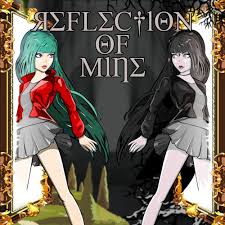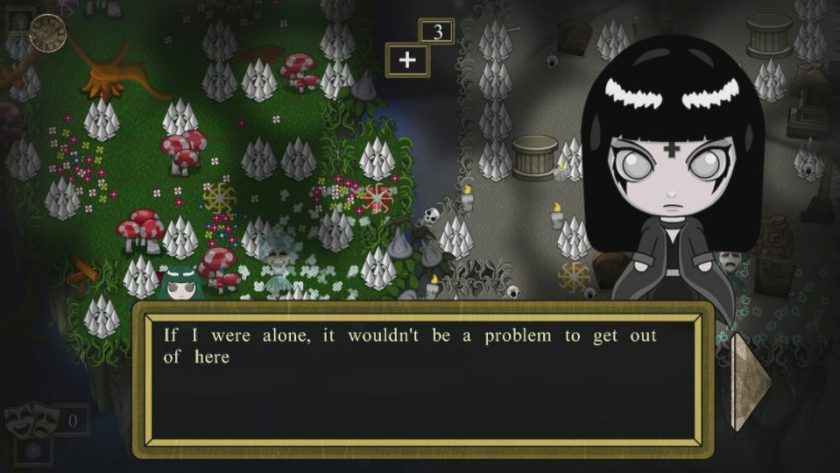Search
[{{{type}}}] {{{reason}}}
{{/data.error.root_cause}}{{{_source.title}}} {{#_source.showPrice}} {{{_source.displayPrice}}} {{/_source.showPrice}}
{{#_source.showLink}} {{/_source.showLink}} {{#_source.showDate}}{{{_source.displayDate}}}
{{/_source.showDate}}{{{_source.description}}}
{{#_source.additionalInfo}}{{#_source.additionalFields}} {{#title}} {{{label}}}: {{{title}}} {{/title}} {{/_source.additionalFields}}
{{/_source.additionalInfo}}- Details
- Category: Switch
- By J.R. Sommerfeldt
- Hits: 1869
Reflection of Mine (Switch)

Reflection of Mine
Developed by: Redblack Spade
Published by: Ratalaika Games
Release date: October 9, 2020
Available on: PS4, Switch, Windows, Xbox One
Genre: Horror, Puzzle
Number of players: 1 player
ESRB Rating: T for Teen- Blood, Language, Sexual Themes, Violence
Price: $7.99
Thank you Ratalaika Games for sending us a copy of Reflection of Mine!
The ancient Greek philosopher Seneca is quoted as saying “we tend to suffer more in our imagination than we do in our reality.” I believe that this statement is very true. Unfortunately, some people do not know the difference between the two. For some individuals with mental illness, the lines between imagination and reality are blurred, and they suffer daily to navigate the real struggles of confusion and chaos. One would think that such delicate topics would not be suited for the theme of a video game with a cartoon style, but that hasn’t been the case since February of 2017. That was the month that a small development group called Redblack Spade released the mindbending horror/puzzle title, Reflection of Mine. This game immediately turned heads in the industry when it was revealed that its core plot revolved around a young girl and her many distinct, and often homicidal, personalities. It was a dark premise covered by an innocent and rather childlike veneer.
With the game now available on the Nintendo Switch, I was able to get a copy and try it out for myself. The story of Reflection of Mine centers on a young girl named Lilly Whichgan who suffers from dissociative identity disorder, or DID. The bulk of this game’s content takes place during a special session with a psychiatrist as Lilly attempts to remember the heinous acts that she committed while living as another personality. The puzzles present themselves within Lilly’s shattered psyche as she attempts to move through mental blocks and boundaries to recover lost memories and find herself. Each solved puzzle reveals just a little more about who Lilly is and why she is afflicted by this disease.

Strong Points: Challenging puzzles; good voice acting; ambient soundtrack
Weak Points: Puzzles are often too challenging; visuals do not fit the dark theme; games mechanics are a little too nuanced for most players
Moral Warnings: Some blood; strong language; occult and criminal themes; misappropriation of mental illness
Controlling multiple personalities at the same time constitutes the main puzzle mechanic of the game. Each stage is separated into two (or more) maze-like puzzles that must be completed at the same time. If one character moves left, so do the others, but each character must make it through different terrain than their counterparts. This requires quick and responsive thinking, especially when monsters and other traps move towards Lilly and her personalities. Only by getting all the personalities to the mirror at the end of each level will Lilly have a chance at recovering her sanity.
I truly enjoy a good puzzle game because I feel the best gaming experiences must require equal parts skill and intuition. With that said, Reflection of Mine presents the player with puzzles that quickly go from being challenging to flat out infuriating. Even within the first few stages, I found myself getting lost or stuck within each level. The game is designed to place obstacles in the way of Lilly and her personalities, but I found myself struggling to navigate those obstacles while focusing on all of the personalities at once. Perhaps the difficulty within this game is a metaphor for how hard it really is to navigate the labyrinthian nuances of mental illness. I'm not sure, but whatever the reasoning behind it may be, the sharp difficulty curve makes it difficult to play this game for extended periods of time.
The controls within this game are very basic. Lilly and her counterparts move one step at a time on a grid-like map. As the game progresses, some of these mechanics will change to add to the already-spiked difficulty level. Depending on what scenario Lilly and her counterparts are in, there will be new mechanics that fit the theme of the stage, like taking pills in the asylum while trying to escape. Lilly is restricted to grid-by-grid movements, which can be quite difficult to navigate, especially when some enemies are quite fast and able to pass through obstructions with ease. It honestly takes more concentration than I am able to give.

Higher is better
(10/10 is perfect)
Game Score - 70%
Gameplay: 12/20
Graphics: 5/10
Sound: 9/10
Controls:4/5
Stability: 5/5
Morality Score - 63%
Violence: 4/10
Language: 3/10
Sexual Content: 6/10
Occult/Supernatural: 2/10
Cultural/Moral/Ethical: 4/10
This game has raised some eyebrows since its initial release on Steam back in 2017. Many users who have reviewed this game have commented on its mishandling of mental illness. Lilly, a fictional character, has a real disease called dissociative identity disorder, of DID. Within the game, Lilly appears to have little control over her other personalities, each of which appears to take on an almost demonic form. This game suggests that someone struggling with this sickness has monsters living within them, while those who really do suffer from DID will contest this. There is also a strong anti-religion message to the game, as one of Lilly’s counterparts has an inverted cross on her forehead. Along with that, the level simply called “The Church” shows stereotypical Christians who are over-zealous about their faith and care little for those who are different. As a Christian myself, I couldn’t help but wonder if the development of this game was marred by some sort of tragedy that occurred because of the church.
Though this game does have a child-like aesthetic, it is certainly not for children. The adult themes of mental illness, abuse, and criminal activity easily set this game up as a mature title. However, on top of all of that is the foul language that would not be appropriate for a young person's ears. I did not catch the F word being used, but there was plenty of other choice rhetoric within the content. There are also occult symbols and practices suggested within this title.
Looking back at my playthrough of this game, I am surprised I was able to complete it. With it being incredibly difficult and hosting some very dark themes, I cannot honestly say that I enjoyed playing it all the way through. There were moments where the game presented some interesting and fun mechanics, but then those soon got stale whenever I made so much progress only to be taken back to my checkpoint. This game does have its place among other puzzle titles, but it certainly does not measure up to many of them. If you are someone who suffers from DID, then you will most likely want to shy away from this game, as it does not present those who have this illness in a positive light. Reflection of Mine might have a “cult” following among those on Steam, but it seems as if it is destined to forever live in the shadows.






